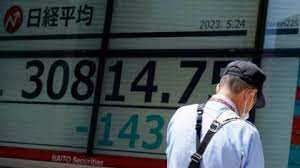LONDON (AFP): Stock markets slipped on Wednesday as investors grow increasingly concerned about stalled US debt ceiling talks aimed at averting a painful default.
Traders were also digesting inflation data in Britain and waiting for the release of minutes of the latest Federal Reserve policy meeting for clues about its interest rate plans.
Wall Street extended losses at the open while European equities were sharply lower in afternoon deals and Asian indices closed lower. Optimism that flowed through trading floors at the start of the week has given way to trepidation, with several Republicans questioning a June deadline over the debt ceiling — and some saying the country is nowhere near running out of cash.
The stock market “is seeing the walls close in on the debt ceiling uncertainty”, said Briefing.com market analyst Patrick O’Hare.
President Joe Biden and House Speaker Kevin McCarthy have had a number of meetings to find a path to lifting the borrowing limit from the current $31.8 trillion. Republicans have set cutting spending next year to 2022 levels as a “red line”, but Democrats have so far refused to commit to that.
Treasury Secretary Janet Yellen has said an agreement must be reached by June 1, otherwise the United States risks defaulting on its debt repayments, which most economists warn could spark turmoil in the global economy and markets.
“Even though there is a strong belief that the US politicians are not foolish to trigger a self-induced economic crisis and that they will reach a deal just before time, appetite in risk assets looks weakened,” said Ipek Ozkardeskaya, analyst at Swissquote Bank.
SPI Asset Management’s Stephen Innes said the debt limit debate “highlights the political polarisation that persists in the US, and casts a cloud over the political process in Washington”.
“The repeated brinkmanship could catch the eye of the rating agencies once again” after S&P downgraded the US credit rating during a similar standoff in 2011, he said.
He added that back then, “the underlying issue was the worsening political polarisation, and it’s hard to argue that the process has done anything other than continue to worsen since 2011.” Inflation and central bank monetary policies also remained in the spotlight.
Falling US inflation and worries about the banking sector have fanned bets that the Federal Reserve would pause its rate-hike drive.
But recent data pointing to a still-strong US jobs market, as well as comments from top officials, have traders worried another increase is on its way.
In Britain, data showed inflation falling under double digits to its lowest level in more than a year, but it remained elevated at 8.7 percent as high food prices offset weaker energy costs.
Analysts said they expected the Bank of England to raise its key rate again as the BoE and the markets had expected consumer prices to fall further.
Elsewhere, oil prices won support from recent Saudi hints that output could be cut to lift prices.







